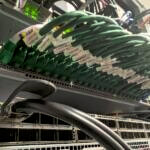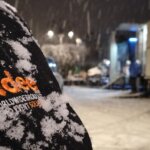The combination of Emmy award-winning Cleanfeed software and Space X’s Starlink satellite internet constellation is redefining live radio by making it easy and cost effective to broadcast high quality, low latency audio from the remotest of locations.
This technological marriage was recently put through its paces by kmfm, a radio station network owned by KM Media Group, which operates throughout Kent in the south of England.
On June 10th, kmfm broadcasted a live programme from Pride Canterbury using nothing more complicated than a connection provided by Starlink, and Cleanfeed, the online studio for live audio and recording.
The one-hour DJ set, which consisted of high energy dance and chart hits, was delivered by Rob Wills, kmfm’s Head of Broadcast and Presenter for the network’s weekday Drive Time slot.
Celebrity guests such as pop star Caity Baser, joined Wills on stage to entertain the 10,000-plus people who were physically at the event in the city’s Dane John Gardens.
The show was also broadcast, ad-free, across kmfm’s network, which has a combined audience of 200,000.
“We have been using Cleanfeed for a number of years, but this was the first time we had trialled it at a music event in front of a live audience,” Rob Wills explained.
“We chose the Pride Canterbury gig because I was already booked to do my usual Floorfiller Anthems show from there.
“For the broadcast, we wanted to capture the crowd atmosphere as well as the music so that audiences listening on their radios got the full live experience.”
kmfm contacted Cleanfeed founder Marc Bakos and asked him to devise a system that would allow the audio feed from Wills’ decks to be combined with the crowd ambience, which would then be sent via Cleanfeed to the studio, in realtime.
“It was very straightforward,” Marc Bakos explains.
“I positioned some wide stereo microphones at the front of the stage to capture the crowd ambience and I mixed that audio with the PA mix of Rob’s performance on the decks.
“The finished mix was sent via Cleanfeed to the studio where producers played station idents.”
Wills adds: “Hoping for crystal clear sound wasn’t a concern because we knew from previous experience that Cleanfeed always delivers broadcast quality live audio.
“In fact, our only worry was connectivity because you do need an internet connection to work with this software and we were in the middle of a park where thousands of people were all using network capacity.
“We were not sure how we could reliably achieve a solid connection.”
The solution was to use Starlink. The small satellite dish required to access Space X’s satellite internet was positioned backstage and all Marc Bakos had to do was connect his laptop to his mixer and login to Cleanfeed via Starlink.
“In the past we have used Cleanfeed from remote locations using 4G and 5G networks, but when you have a lot of people in one place, all on their mobile phones, those networks get oversubscribed and can be unreliable,” he explains.
“Starlink was the perfect solution. It isn’t expensive to set up an account and because Starlink’s satellite network is low orbit there are none of the latency issues you typically expect with satellite technology.”
kmfm’s live broadcast from Pride Canterbury went off without a hitch and Rob Wills says he is delighted with the results.
“The reason we like working with Cleanfeed is because the company is always willing to push the boundaries,” he says.
“There are other remote live audio recording solutions on the market, and I have tried them all over the years, but in my view only Cleanfeed gives me the reliability I need to feel secure.
“On June 10th I knew that all we had to do was connect to the internet and everything we pumped down the line from Pride Canterbury was going to reach kmfm’s studio in broadcast quality, with no dropouts or issues with sound cards or any other difficulties.
“Having that kind of security is what makes experimentation possible. We can come up with the craziest of ideas and know that we have a good chance of making them work.”






